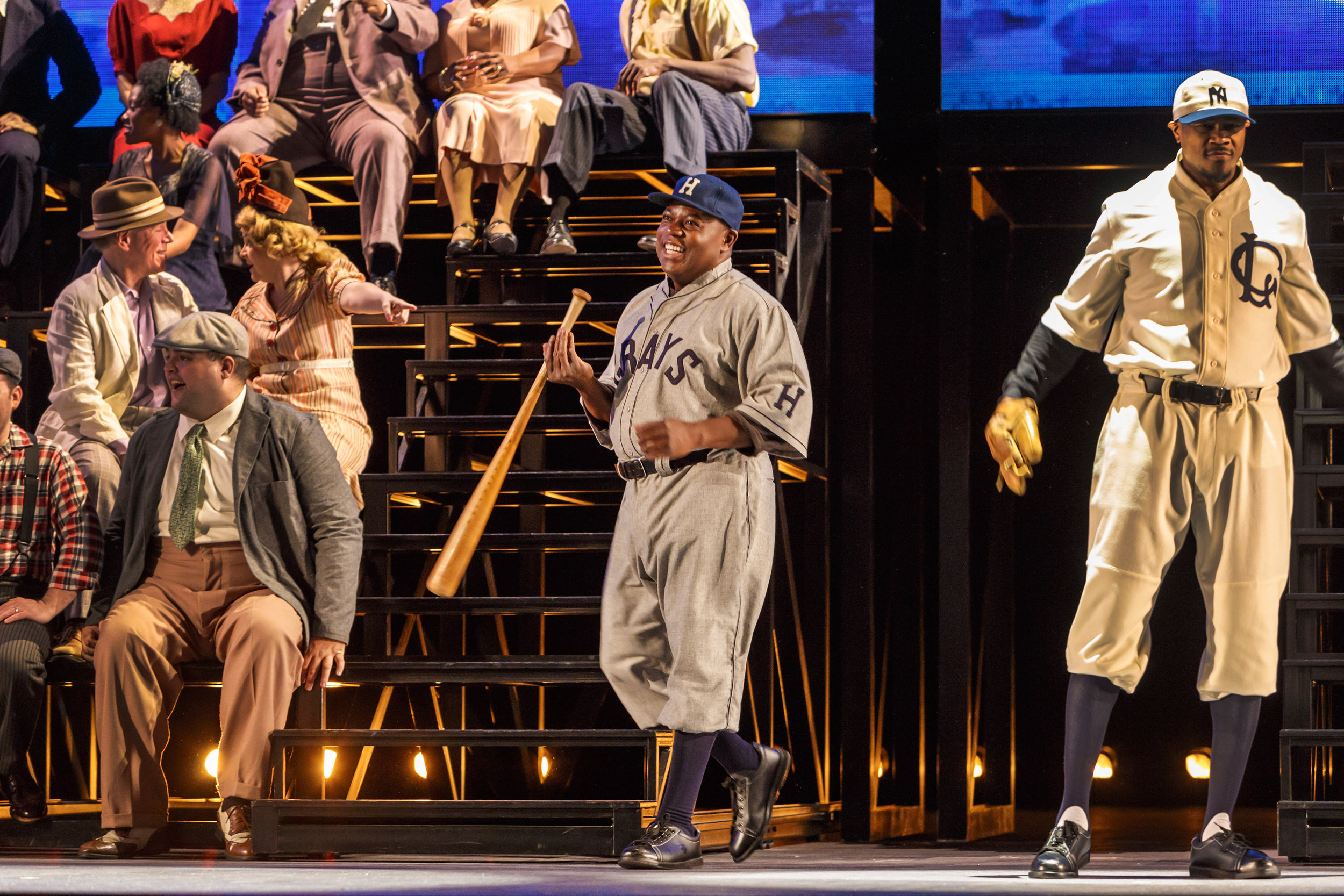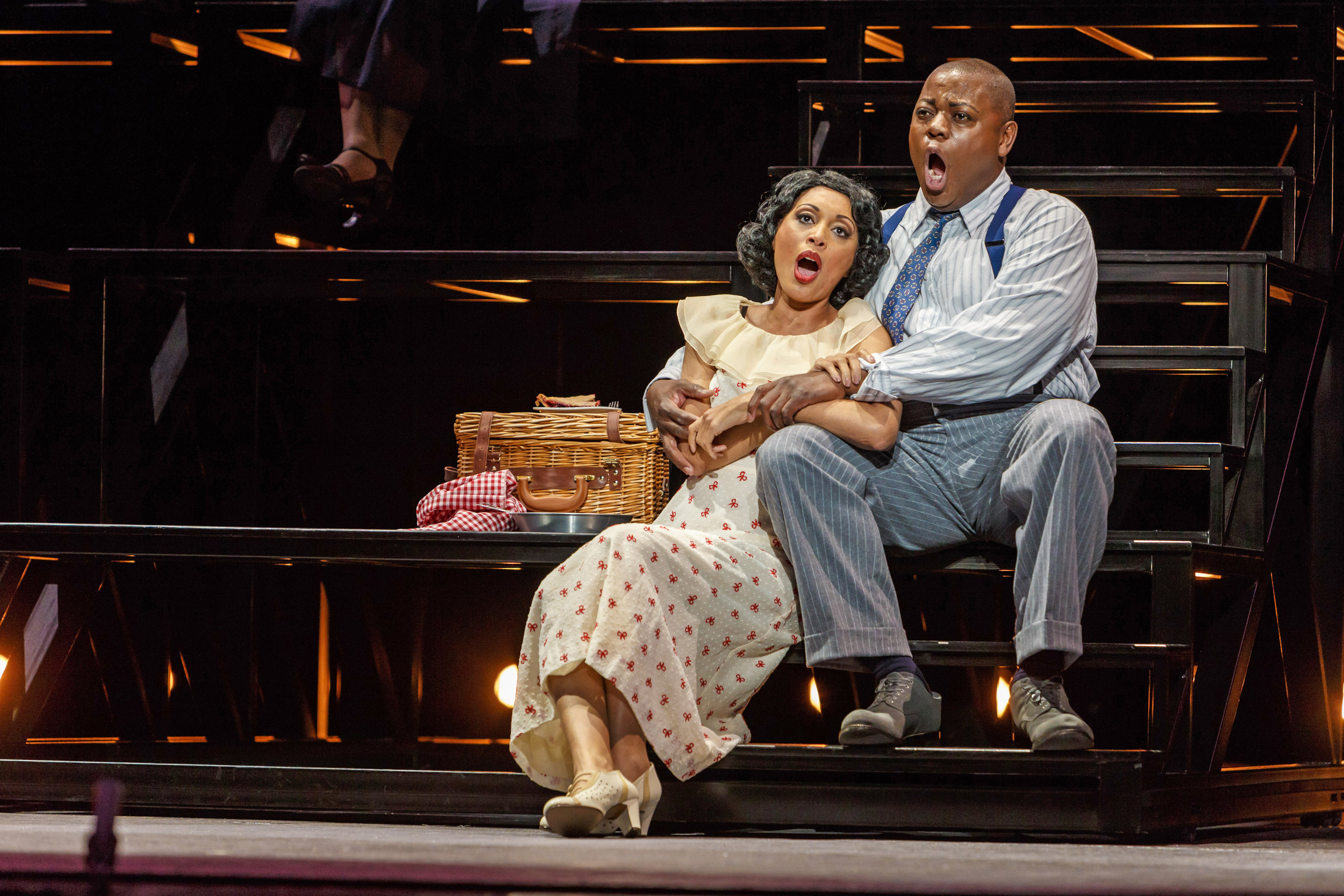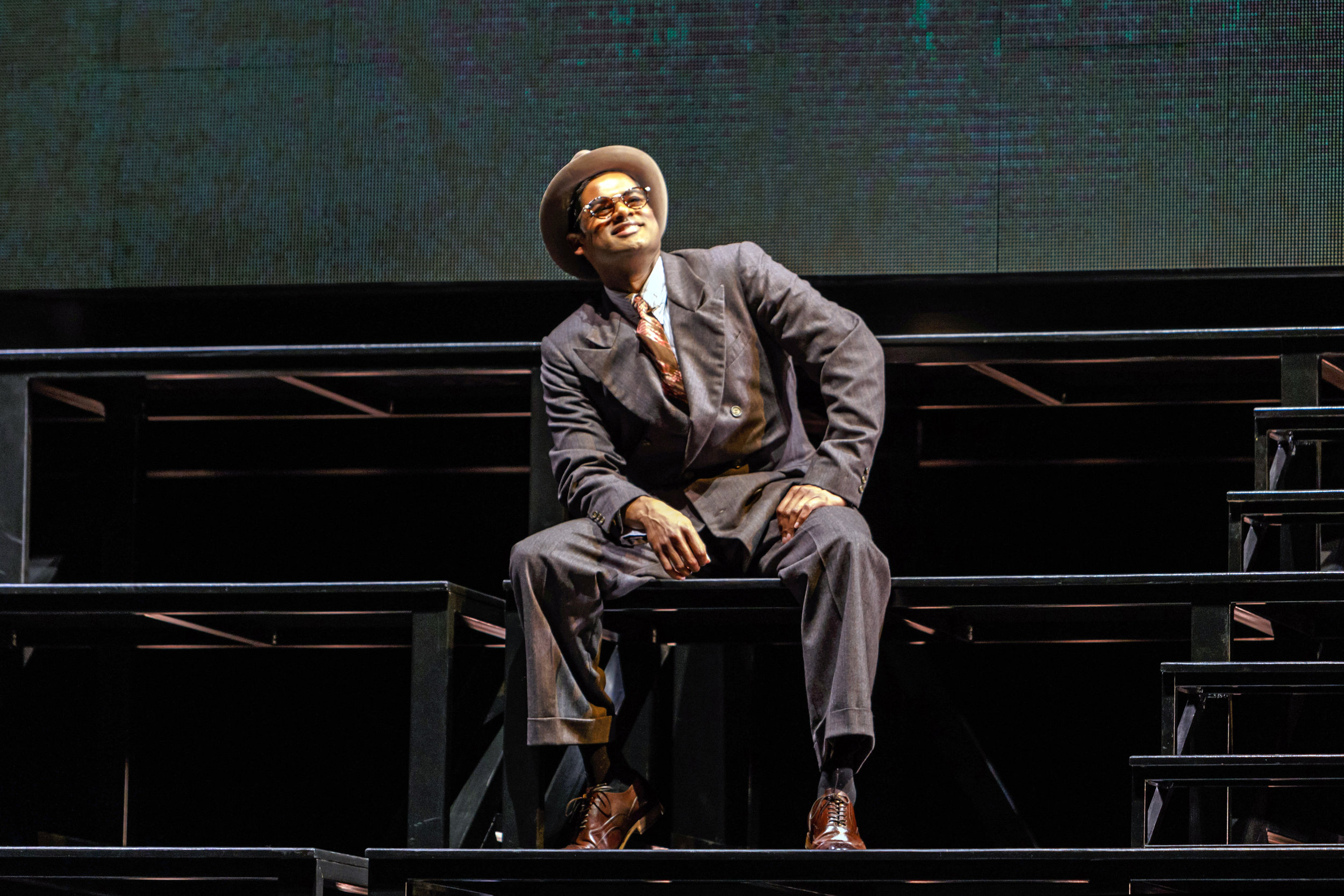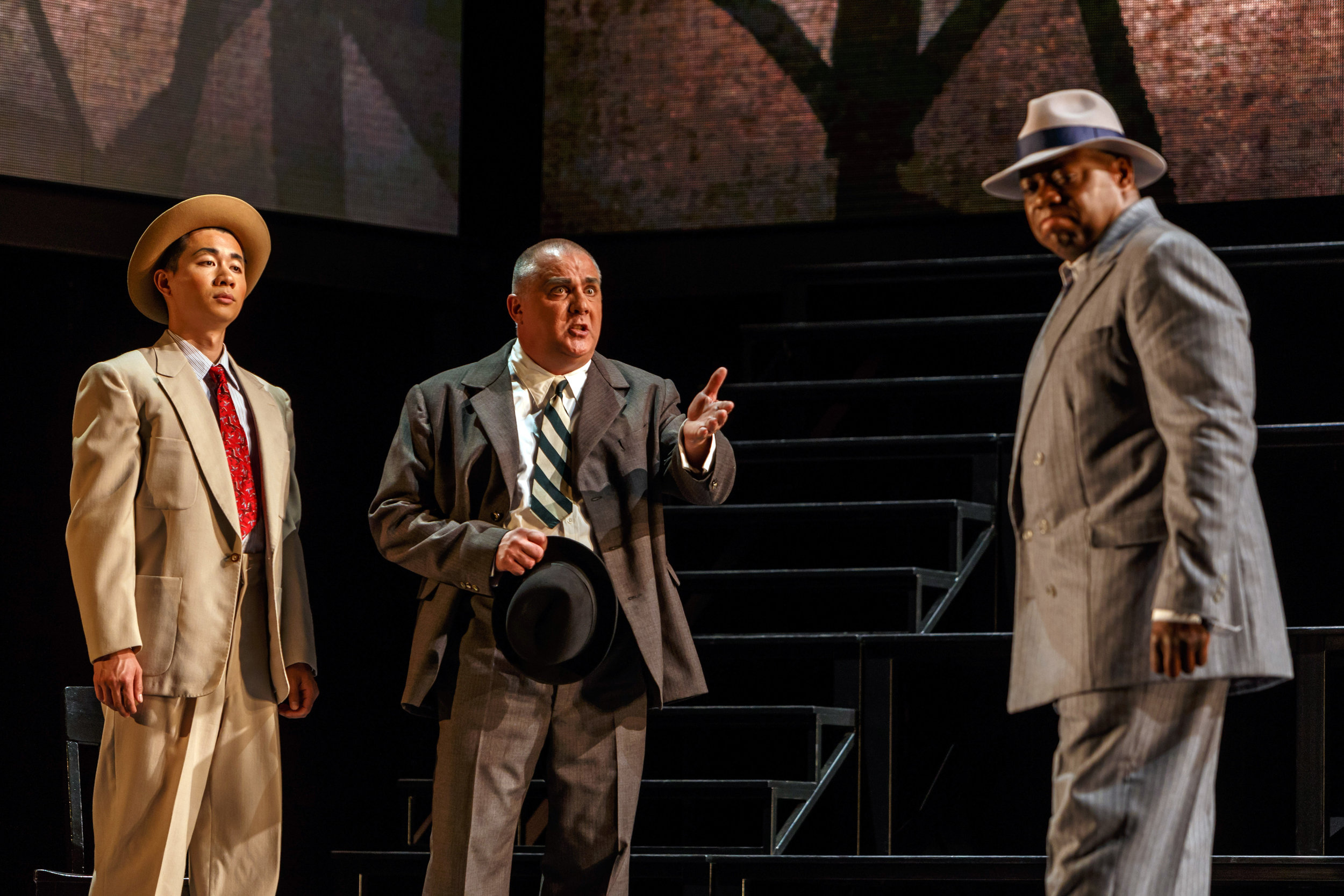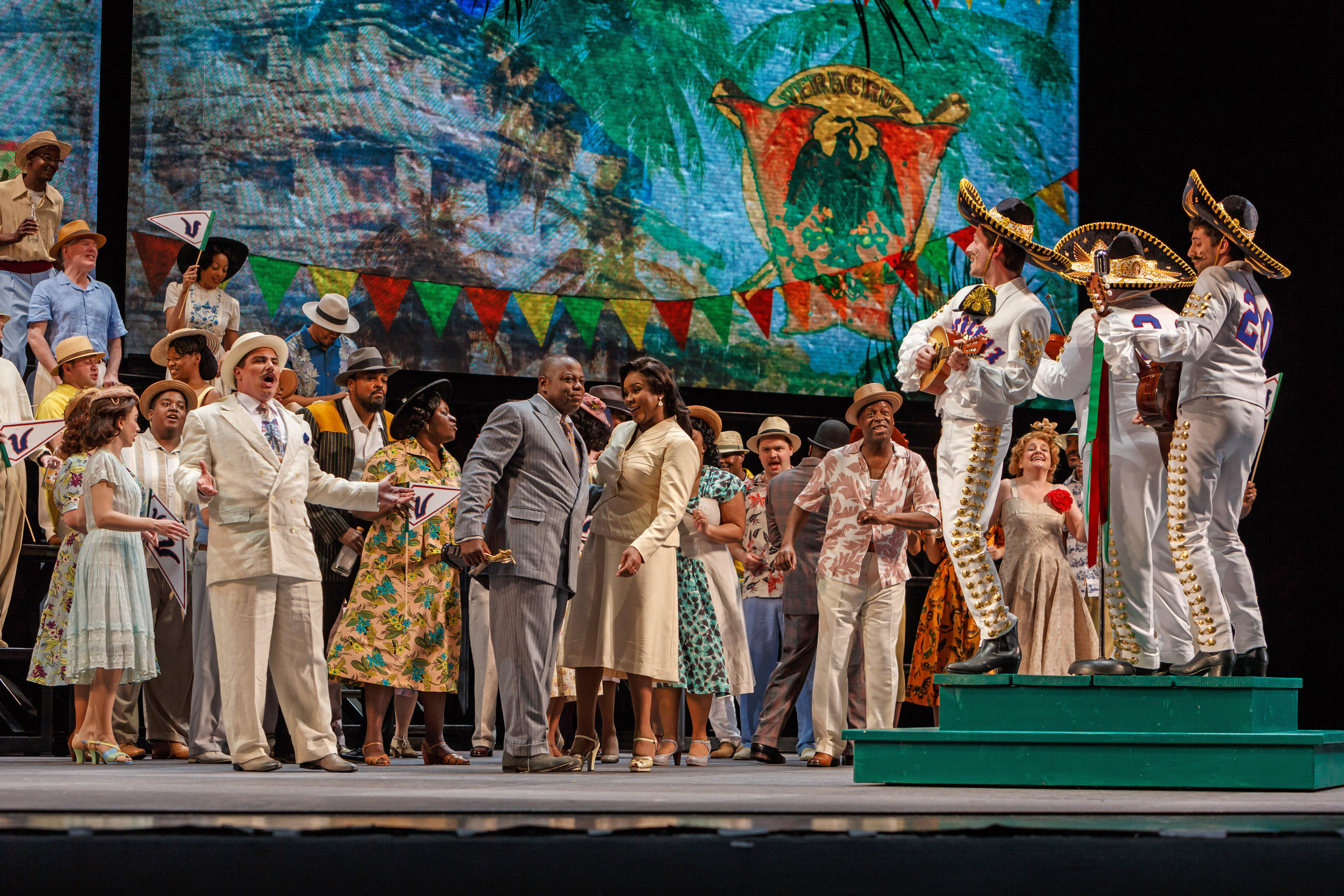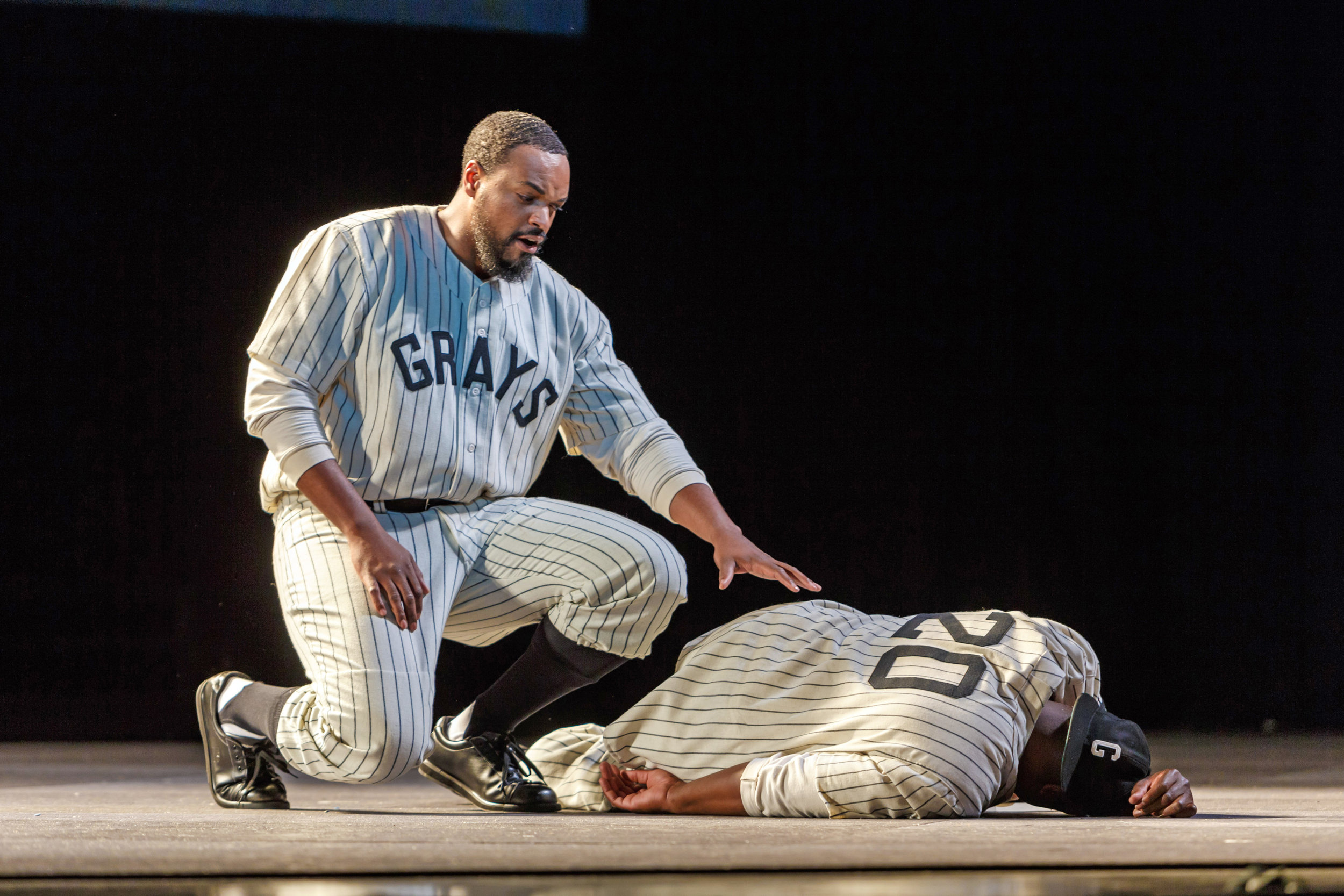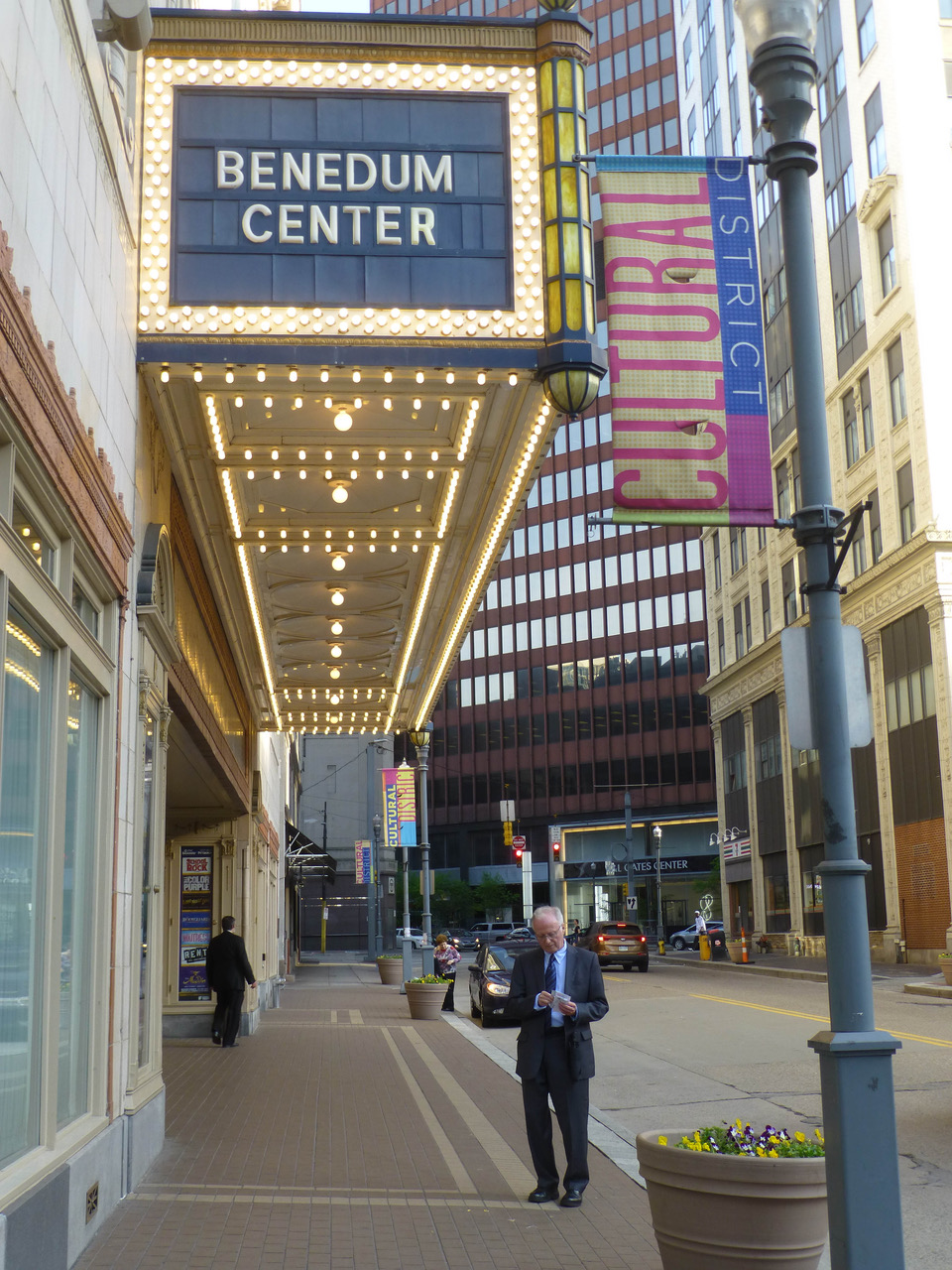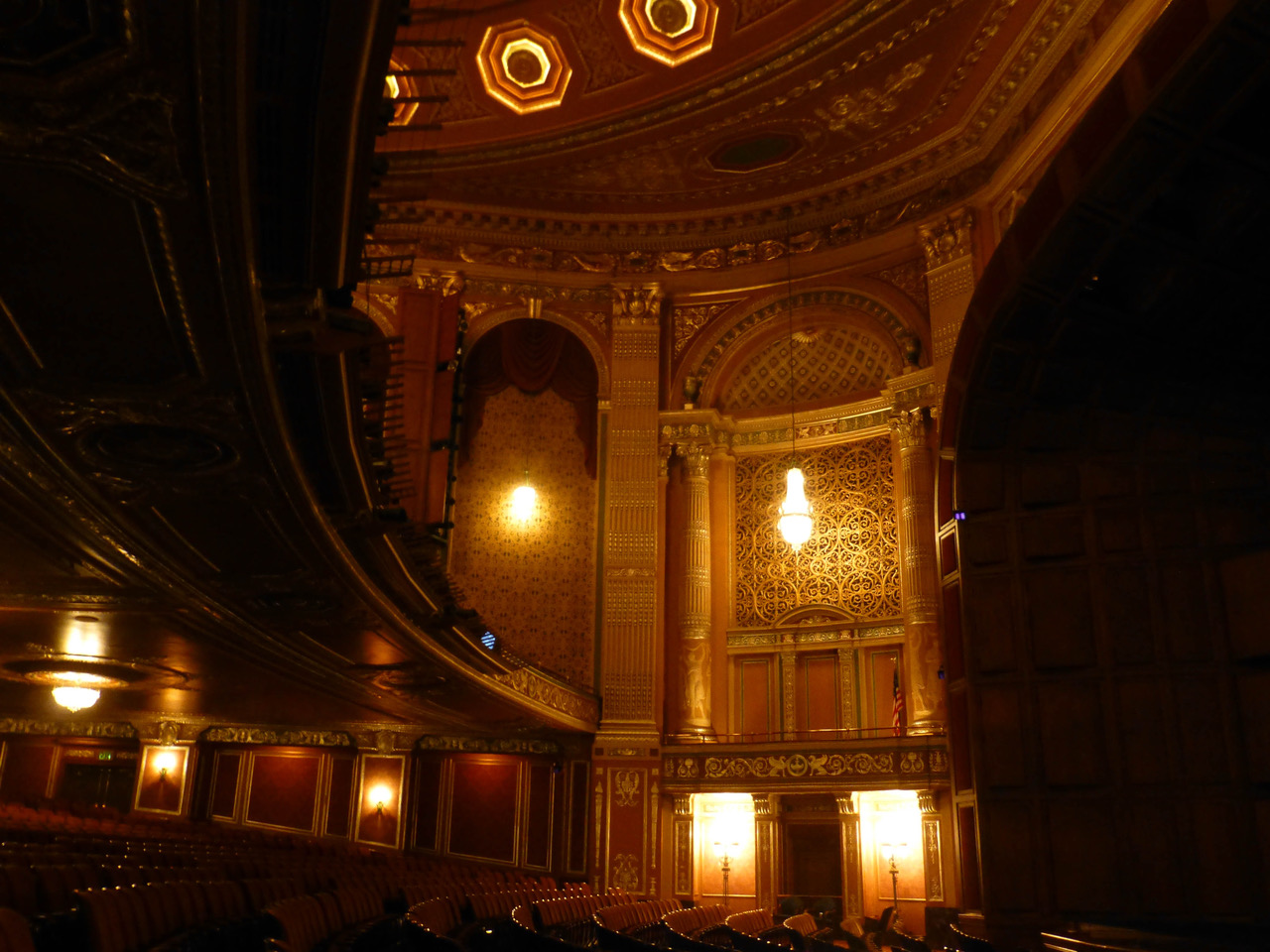I was both excited and scared to attend Pittsburgh Opera’s The Summer King. I love opera, and I am particularly fond of new opera. My wife and I drove all the way from the suburbs of DC to attend Saturday night. It was the world premiere of this new opera by composer Daniel Sonenberg (librettists are Sonenberg and Daniel Nester with additional lyrics by Mark Campbell); it is revised and fully staged after an earlier concert opera presentation. And I love baseball, a fan since I was a young boy. Attending the premiere of a new opera about baseball had special appeal, but honestly, I was also worried. What if I didn’t like it? I write an opera blog, and I would hate to say negative things about a new opera, especially about baseball. I am both pleased and relieved to say that my fears were not realized. And in truth, this opera is about much more than baseball. It is about swinging the bat in life itself.
Left photo: Josh Gibson (Alfred Walker) prepares to face Broadway Connie Rector (Gregg Lovelace) at Yankee Stadium in 1930 . Right photo: Josh Gibson (Alfred Walker) and his wife Helen (Jacqueline Echols) sing of the bright future that awaits them. All photos by David Bachman Photography; courtesy of Pittsburgh Opera.
Most of us developed our love of opera from listening to the great masters of the eighteenth and nineteenth centuries. The operas of Mozart, Verdi, Puccini, and Wagner are still the preferred staple of today’s audiences. If you have been to modern operas, you know that you should anticipate that a new one will be different from traditional opera in important ways. Operatic singing remains, but modern opera utilizes different styles of music and opera structure, and it typically addresses modern themes that current audiences can more easily relate to. For The Summer King, think opera, but also think musical… bio-pic…drama…cultural event. For the music of The Summer King, think Gershwin, not Mozart…think “An American in Paris”, more than “Rhapsody in Blue”. I am especially pleased to be able to report that I liked the music, quite a lot. Conductor Antony Walker and the orchestra made the music come alive. Sometimes it was boisterous with individual instruments surging to the forefront like baseball fans shouting from the stands. Sometimes it was soft and sweet, as caressing as words of love spoken between Josh and his wife. It varied in style by scene, frequently pleasingly jazzy. One aspect of the music I did not like was the overuse, in my opinion, of mariachi music for the scenes in Mexico. While appropriate for the setting, this music seemed too genre-driven and derivative. It felt copied from the Mexican music playbook, and as a result, for me, the unity and overall integrity of the piece was interrupted. And as is the case for every modern opera I have attended, I wished for additional melodic arias. Overall, though I can see myself listening to this opera’s music separately from the staged opera and hope it will be recorded at some point.
Left photo: Pittsburgh Courier reporter Wendell Smith (Sean Panikkar) tells how he got passed over by a white baseball scout and decided to turn his energies to writing. Right photo: Calvin (Brian Vu) and Clark Griffith (Ray Very), the owner of the Washington Senators, tell Josh Gibson (Alfred Walker) that it was in his own best interests that they not sign him to their major league team. All photos by David Bachman Photography; courtesy of Pittsburgh Opera.
There were scenes in both Act I and II where I thought the pace slowed down and lost momentum. On those occasions, I started to dismiss The Summer King as not quite making the opera majors, just a good minor league opera. However, the story and drama of Josh Gibson’s life kept pulling me back into the moment and elevating the opera’s level of play. This story has sadness, but also the joy of love, the thrill of triumph, the bitterness of unfairness, our need for hero worship, the stress of racial tension, the burden of societal demands on the individual, and the meaning of a life over time. Josh Gibson, who grew up in Pittsburgh, was a baseball player in the American Negro leagues of the thirties and forties of such extraordinary talent that he was inducted into Baseball’s Hall of Fame, even though he was never allowed to play in the major leagues because of the color of his skin. He is often referred to as the black Babe Ruth, and sometimes, Babe Ruth has been referred to as the white Josh Gibson. An important focal point of the story emphasizing his hitting prowess are eyewitness reports that Mr. Gibson once hit a ball completely out of Yankee stadium; he hit that ball a long way, a feat never accomplished by any major leaguer. He managed some fame and financial success by playing a few years in Mexico where his skin color was not an impediment. The extraordinary pathos of his life was caused not only by racial segregation, but by the death of his wife during childbirth, shortly after they were married in their late teens. It was a crushing blow to the young baseball player. Gibson himself died of a brain tumor at only 35 years of age, a condition affecting his behavior in the years just prior to his death. As he matured and his talent became evident, he was pushed to attempt to break the color barrier of baseball’s major leagues; Jackie Robinson was to do that in 1947. Though wanting the opportunity to compete in the majors, becoming the vanguard of a cause was not a role that he desired, though he may have accepted it. Gibson was a likable, well-mannered man who only ever wanted to love his wife and to play baseball. Life gave him so much, took away so much, and demanded much of him. I wish I could have seen him hit that ball out of Yankee stadium.
Left photo: Josh Gibson (Alfred Walker), Grace (Denyce Graves), and others celebrate Señor Alcalde (Eric Ferring) naming Josh 1941 league MVP in Veracruz, Mexico . Right photo: Sam Bankhead (Kenneth Kellogg) mourns the death of his best friend Josh Gibson (Alfred Walker), who died at the age of 35. All photos by David Bachman Photography; courtesy of Pittsburgh Opera.
Staging for this challenging two-act, multi-scene, biographical opera was creative and clever. I especially liked the baseball scenes with catcher, hitter, and batter all facing the audience. There was a large cast and chorus, and the singing was generally excellent. Scoring the role of Gibson as a baritone was just right, giving gravitas to the weight of life he felt. The role was sung by Alfred Walker, an international singer noted for his Wagnerian roles. He played the role perfectly, displaying charm in the happy moments and affecting sadness in the bitter ones. A part of me wishes a younger singer had portrayed the early years; I would have liked to have seen the young Gibson. International opera star Denyce Graves, who played Grace, Josh's girlfriend, sang a touching and beautiful farewell-to-Josh aria in act II, one of the more sustained melodic pieces. Soprano Jacqueline Echols, seen recently in Washington National Opera’s production of Dead Man Walking as Sister Rose, hit just the right notes in her brief role as Gibson’s attractive, loving wife. Sean Panikkar played journalist Wendell Smith who tried to enlist Gibson in breaking baseball’s color barrier. He has a high tenor voice that stood out and I hope to hear him again. The chorus was used effectively. The ending scene did seem to some degree as an add-on and has been criticized as not needed, but I disagree. The children’s chorus singing about Josh’s mighty home run at Yankee stadium ended the opera on notes of both awe of Josh Gibson’s extraordinary baseball abilities and the hope that the young provide that things might get better. For a professional review, I point you to an excellent article, both balanced and on target, written by Robert Croan of the Pittsburgh Post-Gazette.
I classify The Summer King as a hit. I think it belongs among the modern operas I have seen recently, Cold Mountain, Breaking the Waves, Champion, and Dead Man Walking. The compelling presentation of the life story of Josh Gibson and the pleasing music are its major strengths. Attending new opera is fun and I found this new opera both entertaining and touching, an experience that will stay with me for a very long time. Kudos to Pittsburgh Opera for its courage and commitment in bringing forward this new opera.
Composer Daniel Sonenberg at the pre-opera talk. Photo by Debra Rogers.
The Fan Experience: My wife and I drove to Pittsburgh from the suburbs of DC. It is theoretically a four hour (250 mile) drive with speed limits of 65-70 mph for the majority of the way, and there is a toll on the Pennsylvania Turnpike. Because of traffic volume, accidents, and lane closures due to road repair it frequently takes longer; we endured an hour back up due to one lane closure, among several. Traffic into Pittsburgh and out on Sunday had a couple of unexpected areas of congestion for a weekend. Check traffic congestion on Google Maps or other services before heading that way to find alternate routes if needed. The streets are narrow and convoluted in downtown Pittsburgh lined by tall buildings and our GPS had trouble picking up the signal; take a map and directions with you for your hotel. The three rivers setting with multiple bridges, while lovely to take in, also add to the traffic complexity for newcomers. Major league sports here attract crowds to the downtown area. Hotels in the Cultural District are not cheap, but are not exorbitant like NYC and are within walking distance to the Benedum Center. There are quite a few parking garages in the area, many with 24-hour parking rates of only around $15. The Benedum Center concert hall seats 2,800 and seems well designed for opera performances. Its décor suggests an earlier, steel-powered era; it is decorated in brass and dark paneled wood with stunning glass chandeliers. It was built in 1928 and restored in 1987 to its original form. Pre-opera talks are given an hour prior to performance. The talk Saturday night included an appearance by the composer Sonenberg who talked about his fascination with Josh Gibson since his own boyhood and how that led him to write the opera. A typical advantage of attending the premiere of new opera is getting to see the creators, in this case, Sonenberg, Nester, and Campbell, take bows on stage after the performance. Tickets are priced moderately and at many levels. Good restaurants can be found in the area; we had dinner at Eleven and it was excellent. We experienced no real problems and have no complaints other than the traffic. Two performances of The Summer King remain, an evening performance on May 5 and a matinee on May 7. The opera has received a strong response but good seats can still be had.
Outside and inside snapshots of the Benedum Center for the Performing Arts. Photos by Debra Rogers.


